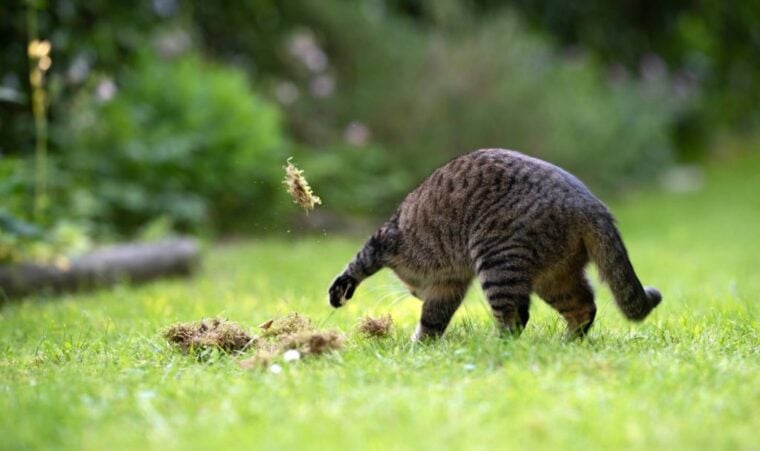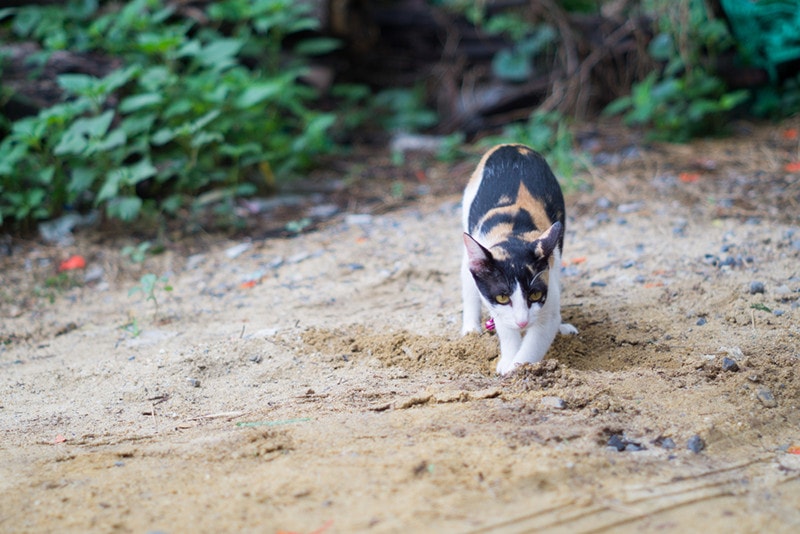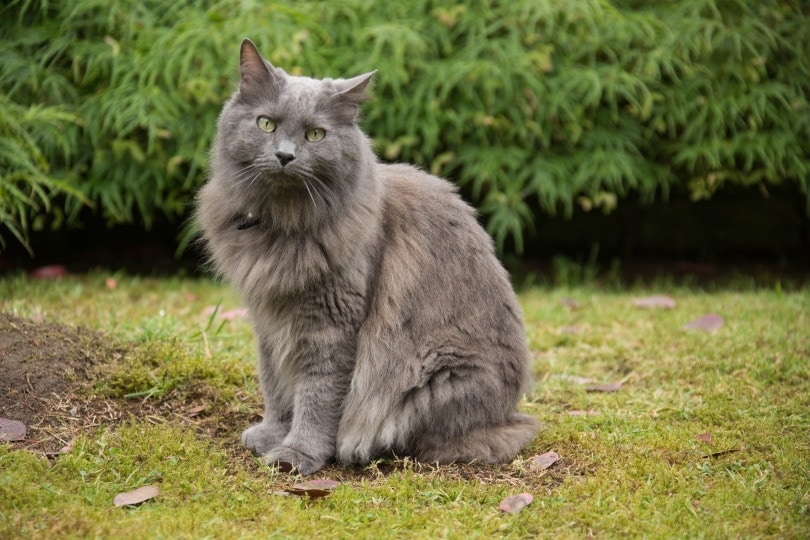
Anyone who has spent enough time around a cat knows they have strange quirks. Whether your cat bounces off the walls or stares intensely into space, it can be difficult to explain exactly why she is displaying such behavior. Another odd behavior that may seem difficult to explain is your cat’s tendency to bury her food. Why does she do this? Well, it turns out that there are several reasons why a cat might bury her food.
While many cat behaviors may seem strange, there is often a method to the madness. Cats act on instinct, so when your cat buries her food, you can assume there is a reason–even if you don’t fully understand. In this article, we will look at 6 possible reasons why your cat may bury her food.
The 6 Reasons Your Cat May Bury Her Food
1. She Is Masking the Scent of Her Food
Your cat may be a spoiled, pampered house kitty, but that doesn’t mean she will be any less vigilant. Her instincts encourage her to be alert, keeping her aware of any possible signs of danger. This attentiveness would serve your cat well in the wild, where she would need to be cautious of predators, natural disasters, or other threats.
One of the ways that your cat remains vigilant is by masking the scent of her food. In the wilderness, your cat would hunt and kill her prey. If she had any food leftover from her meal, she wouldn’t want to leave it in the open. The scent of the kill could attract other predator animals that could harm her. So, your cat is hardwired to bury her food to cover up the smell of her prey.

2. She Wants to Protect Her Kittens
If you have a female cat that recently gave birth to a litter of adorable kittens, she could be burying her food due to a protective maternal instinct. As mentioned before, the act of burying her food can stem from a desire to hide the scent of her kill from other predators. This cautionary measure can be for her own safety, but it can also be for the safety of her young ones. If a predator were to come too close and spot the kittens, her babies would be in grave danger. Keeping other animals away helps keep her kittens safe.
Likewise, your cat may be burying her food to save food for her kittens. Growing kitties need lots of calories and nutrients, so a mother cat may bury food to ensure she always has something to feed her babies.
3. She Is Trying to Keep the Area Tidy
It may be hard to believe, considering how some cats are messy eaters, but cats like to keep their feeding areas tidy. Cats like to groom themselves and drink clean, fresh water, so they obviously enjoy hygienic surroundings. While many of them can be messy eaters, that doesn’t mean they don’t try to tidy up to the best of their abilities afterward. If you notice your cat scratching around her food bowl, it may be a sign that she wants her feeding area cleaned up.

4. There Is Too Much Food in Her Bowl
Many cats loudly complain when they want more food, but did you know they can quietly complain about having too much food, too? While your cat likely won’t beg and yowl like she does when she wants more food, she may send you subtle signs that the food portions you are giving her are too much. For example, if you notice your cat trying to bury her food often, that may indicate that she is trying to store the food for later–meaning it might be too much for her.
Unfortunately, there is no clear-cut way to determine how much food you should feed your cat. The most accurate way to estimate your cat’s needs is to consult your vet and consider your cat’s age, size, activity levels, and metabolic rate. You can construct the best dietary plan for your pet with your vet.
Make sure you’re feeding your cat the right amount, check out our cat food calculator here:
The exact amount of calories an individual animal needs to maintain a healthy weight is variable and influenced by many factors including genetics, age, breed, and activity level. This tool is meant to be used only as a guideline for healthy individuals and does not substitute veterinary advice
5. She Is Saving It For Later
Have you ever gone to a restaurant, ordered a large portion of food, and then took part of it home for leftovers? When your cat buries her food, she is basically doing the same thing. In the wild, hunting requires a lot of time, effort, and energy. If your cat manages to bring in a bigger kill that she can’t eat all in one sitting, she won’t want all of her hard work to go to waste by leaving parts of her kill uneaten.
So, she may bury the remaining parts of her meal so she can return and snack later. This behavior gives wild cats the freedom to hunt less frequently. If they have leftovers buried, they don’t need to expend their energy on the hunt repeatedly. There’s no need for domestic cats to hunt, but the instinct remains.

6. Her Food Doesn’t Smell Good
For the most part, your cat burying her food isn’t immediately concerning. It’s usually a sign of residual instinct taking its course, and occasionally, it’s a hint that your cat is being fed too much. However, there can be instances when your cat attempts to bury her food due to something much less pleasant.
If you notice your cat burying her food and seeming reluctant to eat it, check her food. This indicates that her food may be moldy, rotten, or otherwise inedible. Before offering food to your cat, always check the “best by” date and the seal on the package to ensure that the food is of the best quality.
Is It Bad for Your Cat to Bury Her Food?
Now that you know some of the main reasons for this behavior, you may wonder whether it is safe for your cat to bury her food. Thankfully, you have nothing to worry about. It is perfectly normal for a cat to want to bury her food, and it is observed in wild cats.
Just because the behavior isn’t bad doesn’t mean it can’t be a nuisance. If your cat has made a habit of scratching up your floor while trying to bury her food, you may be looking for solutions. Thankfully, there are ways to redirect this behavior.

How to Prevent Your Cat from Burying Her Food
Since burying food is a normal, natural behavior for your cat, you should never scold or punish her for engaging in it. Even if it results in scratches on your belongings, you should avoid punishments and instead redirect the behavior.
If you punish your cat for following her instincts, she will become afraid and confused. She may be reluctant to participate in other healthy behaviors because she thinks she will get in trouble. One way you can discourage this behavior is to remove the food bowl as soon as she is done eating.
That way, she will have no food in sight to bury. If she still tries to scratch at things, you can redirect her attention with a cat toy or something equally enticing. If you cannot remove her food bowl when she is done eating, consider providing her with a puzzle feeder. Puzzle feeders can simulate the hunt, which engages your cat’s mind and distracts her from the impulse to bury or scratch.
Conclusion
When your cat buries her food or simulates burying it, she is engaging in healthy, natural behavior. As long as your cat is not fed too much or served poor-quality food, there is no cause for concern. While you can prevent your cat from engaging in this behavior if you want to, remember to avoid punishments. Punishing your cat will accomplish nothing beyond breaking the bond you have established with your cat. Remember that no matter how inconvenient your cat’s behavior may be, she isn’t doing it to be difficult; she is only trying to feel comfortable and safe in her home.
Featured Image Credit: Nils Jacobi, Shutterstock






